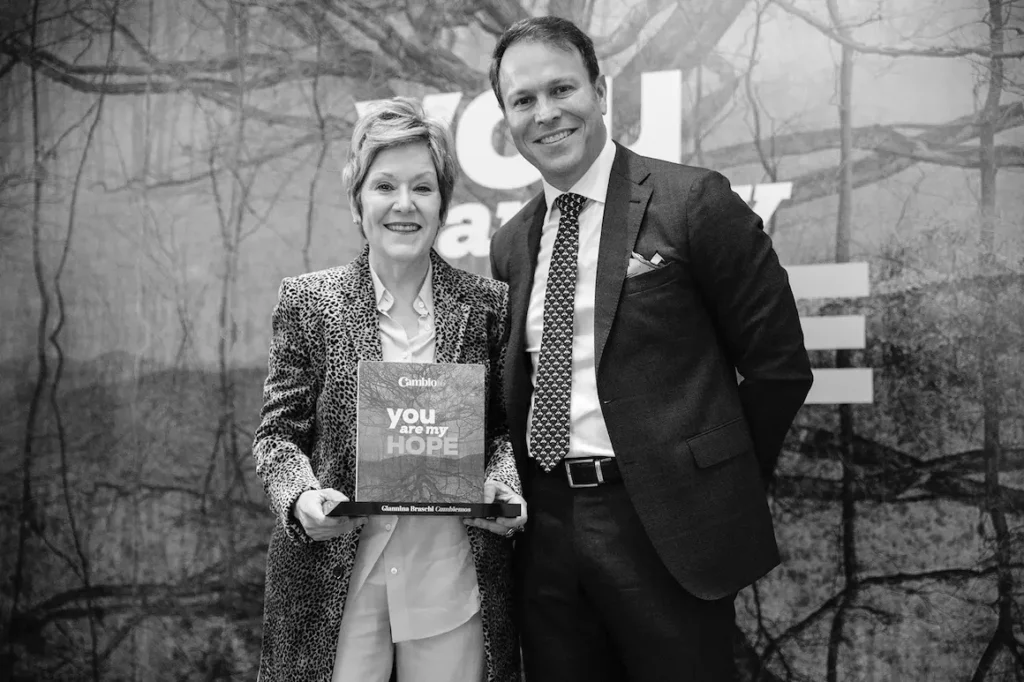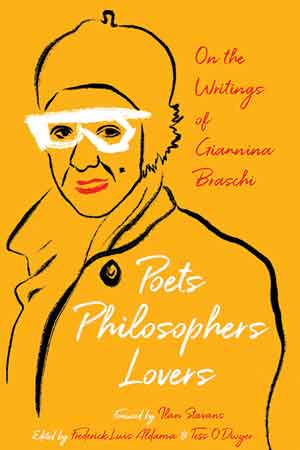Latinx Poet-Philosopher Giannina Braschi: Creativity Begins Where Work Ends
By Jorge Neri Bonilla
The Puerto Rican poet and radical thinker Giannina Braschi won the 2021 Cambiemos Prize in Spain for her life’s work of creating a literature of inspiration and hope. Braschi casts her soul-felt verses in a creative yearning that seeks to extract literature from literature, resulting in a kind of metapoetry in which distinct and diverse styles and voices, attitudes and desires, genres and figures, tongues and languages coexist along with the buzzwords heard at the corner, and the deep and profound regrets of all those who feel. Her work reflects the divine value of ordinary gestures, the daily madness, habits, and customs that fill our lives. For this reason, she is unsettling and emotional: an agitator with gentle manners, who makes paradox her philosophy of life because it is precisely through contradiction that we can appreciate difference, and through activism, the actions that can transform the future. Her literary vision is frank, cordial, ravishingly truthful, innovative, effusive, and naïve, yet also disturbing, and not without a fine sense of irony, which, at times, overflows with acidic and iconoclastic humor.
Born in San Juan, Braschi lives in New York City. She obtained a doctorate in Hispanic literatures from the State University of New York at Stony Brook. She has been a professor at Rutgers, Colgate, and the City University of New York. She is the author of the postmodern poetry epic El imperio de los sueños (translated as Empire of Dreams by Tess O’Dwyer) and the Spanglish classic novel Yo-Yo Boing! (1998). These were followed by her declaration of independence titled United States of Banana (2011).
Braschi writes in Spanish, Spanglish, and English, and with these three languages explores the political issues that face her island and the world. Her work has been adapted widely by her contemporaries. Of note, her poems form the basis of a forthcoming song-cyle by Puerto Rican composer Gabriel Bouche Caro. Her geopolitical tragicomedy United States of Banana was adapted for the theater by the Colombian stage director Juan Pablo Félix (2015) and published as a graphic novel by Swedish cartoonist Joakim Lindengren (2021). Her life’s work as Latinx philosopher, poet, and dramatist is the subject of the scholarly optic Poets, Philosophers, Lovers: On the Writings of Giannina Braschi edited by Frederick Luis Aldama and Tess O’Dwyer (preface by Ilan Stavans, University of Pittsburgh Press, 2020).

Latinx Philosophy and Radical Thinking
Jorge Neri Bonilla (JNB): What do you think of people who look for the positive in everything, including environmental disasters and the pandemic?
Giannina Braschi (GB): I always look for the positive, but if it doesn’t exist, I create it. People who say “all’s good” when all’s not good are collaborating with the bad. The prefer to remain in a state of inertia. They prefer to withdraw and resign themselves and defeat themselves rather than change the situation. They are cynics at heart. Because they don’t want change. To find the negative is not to look for the bad. Rather, it is to not deny that things are not as they should be. We have to look for the positives always, but when it doesn’t exist, we must create it.
JNB: What would happen if contradiction were eliminated?
GB: There would be no Don Quixote and Sancho. There would be no Faust or Mephistopheles. There would be no dialogue, conversation, community. There would be no revolution of us. There would be no love. There would be no death. There would be no life. We would be zombies. We would be walking dead. If we aren’t already. And furthermore, if everything were positive, we would not create. Because we have not yet conquered death. Antigone is born of the negation of Creon. From the negation of the tyrant, the heroine is born.
I have just created an Antigone without the negative force of Creon. Because life has tried to eliminate the contradiction and negativity of the other. What I had to do is deconstruct Antigone’s name: negativity against (Anti-) “gone”. Anti-(against) “gone” (to be here). In my work, Antigone becomes a heroine who wants to affirm the continuation of the human species, on the way to extinction. A dialectic of the human being against herself, of being here or not being here. As if Antigone’s contradiction became a selfie against herself—against the extinction of ourselves as a species.
[An excerpt of Antigone was published in the February 2022 issue of POETRY. Contemporary Latinx philosophy and poetry.]
JNB: Is it true, as some say, that art will save humanity?
GB: To god what is god’s and to the poet what is the poet’s. The poet is no redeemer. The great Greek tragedians—Aeschylus, Sophocles, Euripides—did not save Greece from its decline, but they taught us all to appreciate life more. Art shows us what is. What was. What might have been. What could be. Art is the mirror and the lamp. Or the star and lantern as Gustavo Adolfo Bécquer said. And in my case, it is apocalyptic, revolutionary, and prophetic.
JNB: What advice would you give people who want to change their lives and the world, after the pandemic?
GB: We have to understand how the world awakens to understand how we should awaken. The sun rises gradually, with fragile light, and it escalates in gradations of sounds, in voices, through different stages, until it reaches midday. That is how we should dawn, with gradations of light and energy. Deep rest is necessary to awaken from the deep exhaustion that we have suffered before and during the pandemic. After a deep rest, ideas emerge anew and alight—and thoughts flow without work. Creativity begins where work ends.

BIG OTHER
“Beauty is a defiance of authority.”—William Carlos Williams
This interview was featured as part of the BIG OTHER’s Puerto Rican Writer’s Folio: A Hauntology (a special issue on contemporary Puerto Rican philosophy, art, poetry, and fiction) edited by John Madera.
